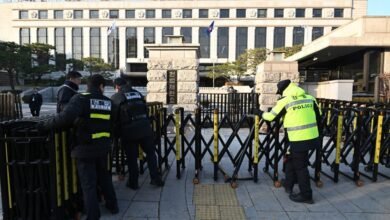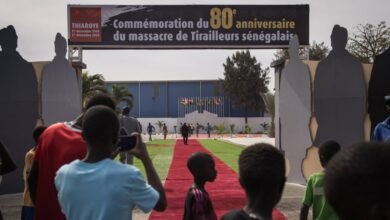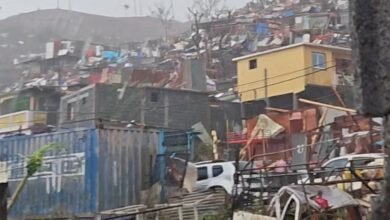Taking Syria: The opposition’s battles shown in 11 maps for 11 days | Syria’s War News

In the early hours of Sunday morning, Syrian opposition fighters announced that they had captured the capital, Damascus, and that President Bashar al-Assad had fled the country.
The announcements came hours after the fighters took a fourth strategic city in a lightning offensive that began on November 27.
In just 11 days, the 24-year rule of President Bashar al-Assad came to an end.
The maps below provide a day-by-day overview of territorial control.
Build-up to November 27
Before November 27, Syrian opposition forces were mostly confined to their stronghold in the northwestern governorate of Idlib, following a ceasefire brokered in March 2020 by Turkish President Recep Tayyip Erdogan and Russian President Vladimir Putin.
The map below shows Syria’s territorial control before November 27.
On the ground, four main groups were competing for control, including:
- Syrian government forces: The army fought alongside the National Defence Forces, a pro-government paramilitary group, and was supported by Hezbollah, Iran and Russia.
- Syrian Democratic Forces: This Kurdish-dominated, United States-backed group controls parts of eastern Syria.
- HTS and other allied rebel groups: Hayat Tahrir al-Sham (HTS), the largest fighting force, was in control of Idlib for years before this offensive.
- Turkish and Turkish-aligned Syrian rebel forces: The Syrian National Army is a Turkish-backed rebel force in northern Syria.
Day 1 – November 27
On Wednesday, November 27, just one day after a ceasefire between Israel and Lebanon came into effect, Syrian opposition forces, led by HTS, launched an offensive from their base in the Idlib governorate in northwestern Syria.
The rebel group said their attacks were in retaliation for recent Syrian government assaults on cities in Idlib, including Ariha and Sarmada, which had resulted in several civilian casualties in recent weeks.

By the evening, the group had seized at least 19 towns and villages from pro-government forces, including military sites, as they pushed into western Aleppo governorate.
The Syrian regime responded by shelling rebel-held areas while the Russian air force carried out air strikes.

Day 2 – November 28
By Thursday, the rebels had captured more territory and expelled government forces from villages in eastern Idlib, then began pushing towards the M5 highway, a strategic road that leads south to the capital, Damascus, about 300km (186 miles) away.


Day 3 – November 29
By Friday, rebel forces had entered parts of Aleppo city after detonating two car bombs and engaging government forces on the city’s western edge, according to a Syrian war monitor and fighters. Syrian state television said Russia was providing Syria’s military with air support.

Day 4 – November 30
By Saturday, images and videos began circulating online showing rebel fighters taking photos next to the ancient Citadel of Aleppo as they advanced through the city.

After capturing Aleppo, the rebels advanced south, towards Hama.

Day 5 – December 1
By Sunday, Syrian and Russian jets intensified their air attacks in Idlib city and positions in Aleppo as government forces tried to slow the advance of opposition fighters.
In his first public comments since the start of the offensive, President al-Assad said his forces would continue to defend the government’s “stability and territorial integrity against terrorists and their supporters”.

Day 6 – December 2
Fierce battles continued in the outskirts of Hama as Syrian opposition fighters advanced to the strategic central city – Syria’s fourth largest.
As the site of the most brutal politically motivated massacre in Syria’s recent history, the city also held symbolic importance.

Day 7 – December 3
The Syrian government said its counteroffensive had pushed back opposition fighters attempting to advance into Hama. In contrast, opposition forces said they captured more Syrian troops and Iran-backed fighters in fierce battles.


Day 8 – December 4
Opposition fighters continued to push further south as they captured more towns in the Hama governorate.
A regime air strike killed Syrian photographer Anas Alkharboutli, who was working for German news agency dpa, near the city of Hama. Alkharboutli, 32, had long documented Syria’s 13-year war.

Day 9 -December 5
By Thursday, the rebels announced they had full control of Hama. Seizing the city brought them one step closer to severing the coastal cities of Tartous and Latakia from the rest of the country.
Latakia is a key political stronghold for al-Assad and Syria’s Alawite community, as well as a strategic Russian naval base.

Day 10 -December 6
The capture of Hama paved the way to Homs, Syria’s third-largest city.
Homs, a key crossroads city linking Damascus to Syria’s coastal areas, lies approximately 46km (29 miles) south of Hama.
Al Jazeera’s Omar al-Hajj said Syrian government forces had conducted several air strikes on the main road in an effort to stop the opposition’s advance.

Day 11 – December 7
On Saturday, southern forces started moving and Deraa-based opposition fighters said they seized control of the city, the fourth strategic loss for President Bashar al-Assad’s forces in a week. Deraa, which lies only a few kilometres from the border with neighbouring Jordan, is known as the cradle of the 2011 revolution.

The same day, rebel fighters came within kilometres of the capital, Damascus. By the evening, they had reached its suburbs, and in the early hours of the morning on December 8, fighters captured the capital.

Source link



